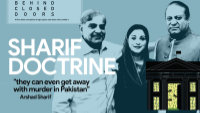Zeitgeist: Addendum premiered at the 5th Annual Artivist Film Festival in Los Angeles, California on October 2, 2008, winning their highest award. It was released free online on October 4, 2008.Director Peter Joseph stated: “The failure of our world to resolve the issues of war, poverty, and corruption, rests within a gross ignorance about what guides human behavior to begin with. It addresses the true source of the instability in our society, while offering the only fundamental, long-term solution.”
Part I follows on from Part III from the original film, citing the specific process of fractional-reserve banking as detailed in Modern Money Mechanics, released by the Federal Reserve Bank of Chicago. In detailing the process of so-called money creation in banks, the film suggests that society is manipulated into economic slavery through debt-based monetary policies by requiring individuals to submit for employment in order to pay off their debt.
Part II is a documentary-style interview with The New York Times best-selling author and activist John Perkins based on his book, Confessions of an Economic Hit Man, in which he describes his role as a self-described economic hit man. In that capacity, he claims to have helped the CIA, as well as various corporate and political entities, to undermine or corrupt foreign regimes that put the interests of their populations before those of transnational corporations. Perkins denies the existence of a conspiracy, because he sees the US as a corporatocracy, in which there is no need for a plot, as politicians like Dick Cheney—who first was a self-professed “public servant” congressman, Secretary of Defense then served as the head of a construction company Halliburton before becoming Vice President—are alleged to be working under the same primary assumption as corporations: that maximization of profits is first priority, regardless of any social or environmental cost.
Part III is a documentary-style interview with futurist Jacque Fresco. The film looks at Fresco’s proposal of a “resource-based economy”, which he claims would create abundance, is environmentally friendly and sustainable. He goes on to discuss technology which he sees as the primary driver of human advancement and he blames politics as being unable to solve any problems, because of what he claims is lack of “technical capabilities”. Fresco claims that his approach is not perfect, but that “it’s just much better than what we have. We can never achieve perfection”.
Part IV of the film suggests that the primary reason for what it sees as society’s social values (“warfare, corruption, oppressive laws, social stratification, irrelevant superstitions, environmental destruction, and a despotic, socially indifferent, profit oriented, ruling class”) is a collective ignorance of “the emergent and symbiotic aspects of natural law.” The film suggests several actions for “social change”, which include: boycotting banks who are claimed to make up the Federal Reserve System, such as JPMorgan Chase and Citibank, turning off TV news, not joining the military, refusing energy from energy companies in favor of making homes self-sustainable with clean energy, and rejecting the political structure. The film closes by asking everyone to “eliminate the divisionary, materialistic noise, we have been conditioned to think is true … while discovering, amplifying and aligning with the signal coming from our true, empirical oneness.”
 Conspiracy Documentaries Showing you the best Conspiracy Documentaries – what the mainstream media wont show you.
Conspiracy Documentaries Showing you the best Conspiracy Documentaries – what the mainstream media wont show you.




Why the hell has nobody commented on this!? This is revolutionary.
No one commented because half of this documentary is absurd the other one is finance and economics 101, which makes very sound, logical and compelling basis for the arguments; however if you read between the lines or have deeper understanding in the subject, you realize that the documentary’s arguments tend to either crumble on itself or are contradicted later.
I have to give credits to John Perkins the only who made sense in this documentary.